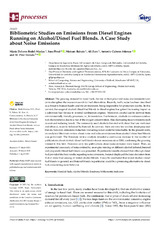Mostrar el registro sencillo del ítem
Bibliometric Studies on Emissions from Diesel Engines Running on Alcohol/Diesel Fuel Blends. A Case Study about Noise Emissions
| dc.contributor.author | Redel-Macías, María Dolores | |
| dc.contributor.author | Pinzi, Sara | |
| dc.contributor.author | Babaie, Meisam | |
| dc.contributor.author | Cubero-Atienza, Antonio J. | |
| dc.contributor.author | Dorado, M.P. | |
| dc.date.accessioned | 2021-04-05T12:00:20Z | |
| dc.date.available | 2021-04-05T12:00:20Z | |
| dc.date.issued | 2021 | |
| dc.identifier.uri | http://hdl.handle.net/10396/21240 | |
| dc.description.abstract | The growing demand for fossil fuels, the rise in their price and many environmental concerns strengthen the incessant search for fuel alternatives. Recently, traffic noise has been described as a threat to human health and the environment, being responsible for premature deaths. In this context, the usage of alcohol/diesel fuel blends in diesel engines has gained increasing impact as a substitute fuel for use in internal combustion engines. Moreover, alcohol can be derived from environmentally friendly processes, i.e., fermentation. Furthermore, alcohols can enhance combustion characteristics due to a rise of the oxygen concentration, thus decreasing major emissions such as soot and reducing knock. The commonly used alcohols blended with diesel fuel are methanol and ethanol, recently followed by butanol. In contrast, there are very few studies about propanol blends; however, emissions reduction (including noise) could be remarkable. In the present work, an analytical literature review about noise and exhaust emissions from alcohol/diesel fuel blends was performed. The literature review analysis revealed a continuous increase in the number of publications about alcohol/diesel fuel blend exhaust emissions since 2000, confirming the growing interest in this field. However, only few publications about noise emission were found. Then, an experimental case study of noise emitted by an engine running on different alcohol (ethanol, butanol and propanol)/diesel fuel blends was presented. Experimental results showed that although diesel fuel provided the best results regarding noise emissions, butanol displayed the least deviation from that of diesel fuel among all tested alcohol blends. It may be concluded that tested alcohol/diesel fuel blends in general, and butanol blends in particular, could be a promising alternative to diesel fuel, considering noise behavior. | es_ES |
| dc.format.mimetype | application/pdf | es_ES |
| dc.language.iso | eng | es_ES |
| dc.publisher | MDPI | es_ES |
| dc.rights | https://creativecommons.org/licenses/by/4.0/ | es_ES |
| dc.source | Processes 9(4), 623 (2021) | es_ES |
| dc.subject | Blended fuels | es_ES |
| dc.subject | Alcohol blends | es_ES |
| dc.subject | Loudness | es_ES |
| dc.subject | Bibliometric indicator | es_ES |
| dc.title | Bibliometric Studies on Emissions from Diesel Engines Running on Alcohol/Diesel Fuel Blends. A Case Study about Noise Emissions | es_ES |
| dc.type | info:eu-repo/semantics/article | es_ES |
| dc.relation.publisherversion | http://dx.doi.org/10.3390/pr9040623 | es_ES |
| dc.relation.projectID | Gobierno de España. PID2019-105936RB-C21 | es_ES |
| dc.relation.projectID | Junta de Andalucía. 1260770 (INMUNOWASTE) | es_ES |
| dc.rights.accessRights | info:eu-repo/semantics/openAccess | es_ES |

